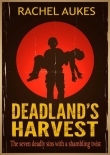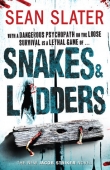
Текст книги "The Guilty"
Автор книги: Sean Slater
Жанры:
Триллеры
,сообщить о нарушении
Текущая страница: 22 (всего у книги 32 страниц)
Ninety-Five
The work was agonizing. Even the most minimal of movements tore his shoulder apart. But the bomber pushed through the pain. Performed the required task. And now it was done.
The bomb was set.
He retreated across the road to a small hole in the hedge bushes of the neighbouring yard. It was a perfect place of concealment – hidden, dark, with a full view of the target residence. It also had the wooden backing of the fence to support him, and he needed that.
Sweat dripped from every pore of his skin, so much that the remote detonator felt slippery in his hands. He tightened his grip, slumped back against the fence, and smelled the putrid stink of his own body odour. He smelled like something that had gone bad.
Old meat in the sun, as his former sergeant often said.
High above, the sky was slowly lightening, the stars turning more and more invisible in the softening blue. The moon was all but gone now, dropped down to her nightly bed, and in the east, the morning sun was rising like a waking fiery beast. The sight made him smile.
It wouldn’t be long now.
They were one step closer to the completion of their mission.
One step closer to retribution.
Ninety-Six
Striker read through an Assault report – a CBH, or a Causing Bodily Harm – in which Chipotle was one of the main suspects in a gang swarming. As Striker read, he put on a pot of coffee. He leaned against the counter, waited, and listened to the machine percolate. Soon, the rich aroma filled the entire kitchen.
As if on cue, Rothschild walked sleepily into the kitchen. He was wearing a red-and-green striped robe, was unshaven, and his silvering hair was sticking out all over the place. He took one look at Striker and nodded.
‘So that’s what your ugly mug looks like in the morning.’
Striker nodded. ‘If I had a few more wrinkles, people would think I was you.’
Rothschild shouldered him aside to get to the counter. Not bothering to wait till the pot was finished brewing, he poured himself a cup. The burner made a hissing sound when the percolating coffee hit it.
Striker did the same, and the two men sat down at the table with the stacks of file folders in front of them.
‘How’d you sleep?’ Striker asked.
Rothschild rubbed his eyes and an almost defeated look filled his face. ‘Dreams of Rozzie.’ He gave Striker a tired look. ‘I sure miss her . . . Does it ever stop?’
‘Do you want it to?’
Rothschild said nothing, he just shook his head in a no manner.
It suddenly occurred to Striker how similar their lives had been. Both of them had spent too many hard years living for the job; both had lost their wives to tragedy; and both were still struggling with the notion of raising their kids.
Striker sipped his brew. The memories were harder to deal with than the investigation, so he changed the subject back to the police-involved shooting of Chipotle and began firing questions at his old friend.
Rothschild soon conceded the point.
‘Yeah, I shot Chipotle. So what? It was a goddam gunfight. Everyone was shooting. Bullets were flying everywhere. Mine was just the one that finally found its target – I had the sniper rifle.’ He took a long sip of his coffee and made a bitter face. ‘It’s old fuckin’ news. I still don’t see how any of this is relevant.’
Striker splayed his hands. ‘It has to be relevant, Mike. It’s the only thing that connects you to the Prowlers. And to Koda and Harry too.’
‘Harry? He was never part of the Emergency Response Team. How the hell is he connected?’
Striker thought of how the two bikers – Sleeves and Chipotle – were linked to the two cops – Harry and Koda – by way of the drugs. Then he thought of how Chipotle and Koda were also linked to Rothschild through the Emergency Response Team and the shooting.
The whole thing was a tangled web. Two separate files that were connected, though only through the people involved.
‘It’s complicated,’ Striker finally said. ‘But there’s no denying one thing – the bomber was at your house, Mike.’
Rothschild nodded. ‘He was also at the Toy Hut, and I got no connection to the shop or that woman he killed.’ He stood up from the table looking stressed out. ‘I need some air.’
He topped off his cup with another splash of coffee, then walked down the hall to the front door. He disabled the alarm, opened the door, and walked out onto the porch.
Striker got up and followed him. By the time he stepped onto the porch, Rothschild had already lit up a cigarillo. The sweet burning smell of wine-tipped tobacco filled the morning air. As much as Striker hated to admit it, he loved the aroma. It reminded him of his father.
At his feet, on the front-door mat, was the morning newspaper. It was all rolled up in an elastic band. Striker picked it up, unrolled it, and read the headline:
Mad Bomber Blowing Up The City
How to Protect Your Family
‘Oh Jesus, you gotta be kidding me,’ he said.
The header was your typical media scare tactic, implemented to sell more papers, and it drove Striker crazy. The editors often unleashed their stories with no concern for the public anxiety it would create. All this would do now was put even more attention on the file, and more pressure on the bombers to achieve their task.
It would speed up their attacks.
‘You see this, Mike?’ he asked.
‘What? Yeah, sure.’
Striker looked up and saw that Rothschild had wandered down to the roadside, where he was enjoying his smoke and watching the sun rising in the east. Next to him was a marked cruiser, and inside it was the patrol cop on guard.
Striker looked farther down the road.
Ten feet away was another car – an old Honda Civic, parked by the kerb. The vehicle was covered with leaves and the right front tyre looked half flat. Striker had never seen the car before, and something about it bothered him.
‘Hey Mike, move over here.’
‘Huh?’
‘Get away from that car.’
Before Rothschild could so much as respond, Striker realized what was bothering him. It was the maple leaves on the hood – they didn’t match the cherry blossoms of the tree above it. On autopilot, Striker swept his hand down to his gun, felt nothing – not even a holster – and realized he hadn’t geared up yet. He felt naked without the gun. Exposed.
He started down the porch steps.
‘Get away from that goddam car!’
Ninety-Seven
Tiny, invisible strings pulled at the bomber’s consciousness as he waited, hidden in the dark crevice of the observation point. Like a slowly coming night, the darkness was pressing in on him, forcing out the light. And his body was weakening as fast as his mind. Thoughts of the big homicide cop kept charging into his mind, and he found that oddly intriguing.
Jacob Striker was the one cop he had no desire to kill. But desire or not, some things were unavoidable.
Collateral damage was often necessary.
He stood there with so many thoughts rampaging through his head. And he fought to stay alert. It was hard. His mind felt off. Like he was losing control. Like he was slip . . . slip . . . slipping away into a semiconscious state . . .
And then the haze cleared.
And Target 4 was spotted.
There, coming down the walk.
The goddam cop.
The bomber took a quick look at the sedan. At the little wooden duck with the red number 4 painted on its chest. It was sitting on the hood. He willed his fingers to relax on the remote detonator, tried to calm his nerves. The plastic device was slippery in his sweaty grip, and his fingers felt clumsy. He flicked the switch. Armed the bomb. And the wheels became hot.
The cop came. Ten feet.
Five feet.
Two.
One.
And the bomber pushed the activation button:
Click – spark – combustion.
The driver’s side of the car exploded in a fountain of flame and light and smoke, showering the cop with metal shrapnel and sending him reeling twenty feet from the percussive blast.
It was done.
Target 4 was eliminated.
Ninety-Eight
Striker and Rothschild stood on the front porch, Striker drinking his coffee and Rothschild sucking back a second smoke.
‘Man, you really need to relax a little,’ Rothschild said. ‘You really scared the shit out of me back there.’
‘I needed you to get away from that car. And fast.’
‘It’s your neighbour’s car.’
‘Well something looked off about it. The leaves on the hood.’
‘The leaves?’ Rothschild let out a soft laugh that was filled with cigarillo smoke, and shook his head. ‘Look thirty metres down – there’s a maple right there. The owner just moved the car a little, probably because it’s got a flat . . . The stress is making you paranoid, man.’
Striker was about to respond to the comment when his cell went off. Being five-thirty in the morning, Striker felt an immediate concern. A call at this time likely meant one of two things – it was a call from Courtney in Ireland, where it was now one-thirty in the afternoon, or it was more bad news from work. Without looking at the caller ID, Striker stuck the phone to his ear. Listened. And all the wind left his lungs.
‘Are you sure?’ he asked.
‘Yes,’ the patrolman told him.
‘Are you one hundred per cent positive?’ he asked a second time.
‘Yes,’ came the answer again.
Striker nodded and said, ‘Get the drains screened . . . we’ll be right down.’
When he hung up the phone and turned around, Rothschild was staring at him, frozen to the spot. The cigarillo dangled precariously from his lips and a wary look smeared his face.
‘What the hell’s going on now?’ he asked.
Striker spoke the words almost mechanically. ‘Terry Osaka was killed this morning.’
‘What?’
‘Ten minutes ago. Just outside his house . . . Another bomb.’
Rothschild looked stunned. For a moment he just stood there and stared. Then he shook his head, threw down his cigarillo, and said, ‘I’m coming with you.’
‘Absolutely not,’ Striker said. ‘You stay here with the kids. They need you now more than ever. I’ll let you know what we find.’
‘I really should—’
‘You can’t, Mike. Not even if you want to. Not until we know how you’re connected in all of this. Until then it’s a conflict of interest.’
Rothschild’s face took on an almost hurt look, but he nodded. Striker gave the man no time to argue. He spun about and beelined back inside the house to gear up and wake Felicia. They needed to get down to that crime scene before the fire trucks did. This time it had to be processed right.
Terry Osaka had not only been a workmate, but a man Striker considered a friend. To think of him dead was too much to process at the moment, so Striker buried the grief swelling up inside of him and focused on what needed to be done.
Go after the man’s killers.
It was the right thing to do. The only thing to do.
Terry would have wanted it that way.
Ninety-Nine
It was just six a.m. when Striker and Felicia arrived on scene at Rosemont Drive, and the sight shocked them. Already, neighbours had spilled out into the street and the fronts of their yards to witness the spectacle of the burning car. The press was also already there, standing flush with the single strip of yellow police tape that blocked off the entire road. One of the reporters, a tall African-American woman with wild, star-shaped hair, recognized him.
‘Detective Striker, Detective Striker!’ she called.
‘No comment,’ he said, and pushed past her.
To his dismay, the firefighters had beaten them to the scene and were busy hosing down the smouldering wreckage of Osaka’s personal vehicle – some type of a sedan, impossible to recognize now. They had used their fire engine to block video coverage from the opposite end of the street.
Striker appreciated that.
In between the smouldering wreck and the fire engine was a soaked white sheet, under which lay an unidentifiable lump. As Striker got closer, he could see two feet sticking out. One of them was wearing a dress shoe, the other only a sock.
‘Osaka,’ Felicia said softly.
The sight hit Striker hard. Deep in his belly, a sickness developed, a feeling he couldn’t quite define. Something between degrees of rage and loss.
‘This should never have happened,’ he said.
To the left of the fire engine, the reporter with the star-shaped afro snuck through the police tape. Felicia swore out loud, then ran over to deal with the woman. Striker watched her go. When Striker saw that she had the situation well in hand, he turned his attention back on the crime scene.
Up ahead, he spotted Corporal Summer. She was rushing around the scene, setting up screens over the drains so that the firefighters didn’t wash away all the trace evidence. Striker ran over to help her. When they were done, she stood up and wiped her brow and looked at him with a lost expression distorting her features.
‘Jesus Christ,’ she said. ‘Osaka.’
Striker pushed away the grief. There would be plenty of time for that later. Right now time was critical. ‘What have we got here, Summer?’
The corporal regained her focus. She raised her hand in the air and whistled loudly, signalling for one of her techs to bring over what they had discovered. A large man in white Tyvek coveralls walked over carrying a twisted steel container. Striker wasn’t wearing latex so he didn’t touch it.
‘That’s the base?’ he asked.
Corporal Summer nodded. ‘It is.’
‘Jesus, that’s a ton of explosive.’
‘HME again.’
Home-made explosive . . . the notion concerned Striker. Not only because of the bomber’s apparent skill in creating the material, but because they were smart enough to realize that all other routes of acquiring a commercial or military grade product would now be flagged.
‘And look at this,’ Corporal Summer said. She held out a plastic bag, containing the remnants of what appeared to be a doll in a policeman’s uniform. ‘Is this what you were talking about?’
Striker took the bag from her and nodded. It was the same kind of toy found at the Toy Hut and at Koda’s place – a ten-inch wooden doll in a policeman’s uniform. Just like before, the head and legs had been blown away in the explosion, making Striker believe that those two areas must have been structurally weaker.
On the doll’s torso was another number. In red paint.
A number 4.
The sight left Striker chilled.
A 6, a 5, and now a 4. There was no more doubting the fact that this was a countdown of sorts – a taunt from the bombers.
But what was the significance? And furthermore, who were the remaining numbers left for? Although only one number had been found at Koda’s, there had been three legs there, so therefore, two dolls. No doll had been found in the carnage of the exploded police cruiser, back at the A&W parking lot, but that didn’t mean one hadn’t been there – the vehicle had burned for a long time. And there was no doubt that the same people had set that bomb.
So had it been placed there for Koda, the resultant victim? Or had it been placed there for Harry? For both of them? Striker went over everything in his mind for the umpteenth time. It was entirely plausible that Harry and Koda were targets 3 and 2.
But if so, then who was target 1?
Only one person came to mind, and it was one that left Striker feeling sick to his stomach.
Rothschild.
He got on the phone with Dispatch and made sure he had units stationed outside his house. Then he looked back at Corporal Summer and cautioned her. ‘The doll is holdback evidence, you understand?’
She nodded. ‘What doll?’
‘Exactly.’
She returned to work, and Striker let her go. Thoughts of his own preoccupied him. Too many of them. And he was still deep in thought when a strong voice with a French drawl called out from behind him. ‘Striker. Striker!’
He knew it at once. Acting Deputy Chief Laroche.
Striker turned around to face the man.
‘Sir?’ he said.
The Acting Deputy Chief looked tired and stressed, but focused. As always, his thick black hair was pristinely combed back over his head and his white commander’s dress shirt was without crease. He came to within a foot of Striker.
‘What is the status of this investigation?’ he demanded.
With forensic techs and patrolmen running all around them, Striker gave Laroche a five-minute rundown of everything that had occurred from the torture scene down by the river, up to and including the death of Inspector Terry Osaka. He left out as much as he could regarding the details of Harry and Koda, and also of the dolls he had found.
It was necessarily prudent to do so.
The Acting Deputy Chief was often like a spinning top, knocking down everything around him with his misguided, erratic decisions. It wasn’t entirely his fault, Striker knew. Laroche always meant well, in his own twisted way. But over the years the man had become more of a manager and politician than a cop. As a result, it was best to placate him with the bare minimum of facts and leave him in the dark on the full details.
‘And that’s when we got here,’ Striker finished.
Laroche’s face remained hard. ‘You’ve been in two gunfights in forty-eight hours. If this was any other day, I’d put you on stress leave and send you for crisis counselling. But we got bombs going off all over the goddam city and cops are being targeted.’ Laroche’s posture sagged, and suddenly, unexpectedly, his expression softened. His face looked fragile.
‘Sir?’ Striker asked.
Laroche cleared his throat. ‘Terry was . . . a good friend of mine. I knew the man for twenty goddam years.’
‘He was a friend of mine too, sir.’
Laroche nodded. ‘Just keep me informed – every step of the way.’
‘I’ll do my best.’
‘Do better.’
Striker made no reply, and seconds later the Acting Deputy Chief spotted Corporal Summer. Without so much as another word to Striker, Laroche spun away from him and cornered her by the car wreckage. With the conversation ended, Felicia walked up to Striker and gave him a dubious look.
‘What was that all about?’ she asked.
‘A difficult situation just got a whole lot more complicated,’ Striker said. ‘Laroche is on the case.’
One Hundred
Harry hadn’t slept a wink all night. Bad dreams and an even worse reality. Eventually, he had gotten up and spent the bulk of the night drinking coffee in an all-night café and listening to the police scanner for more news.
Wish granted.
It had come.
He parked his undercover cruiser on the east side of Kerr Street, directly across from the Fraserview Golf Club. A sense of horrified disbelief swept over him. In the far-off distance, he could see the red gleaming lights of the fire engine and the greyish smoke that poured from the shell of a vehicle. Half-dazed, in disbelief and stupor, he walked up the road until he was flush with the yellow police tape.
‘Media point’s on Killarney,’ the young cop guarding the scene told him.
Harry barely glanced at him. Keeping his eyes focused on the chaos ahead, he took out his wallet and showed the badge. The young cop nodded, took down the badge number, and lifted the tape for him to enter.
But Harry did not budge. He just stood there and watched Striker and Felicia and the RCMP bomb specialist cluster together with Acting Deputy Chief Laroche. His eyes fell to the white sheet that lay a few feet from the smouldering wreckage. ‘Is it true?’
‘Detective?’
‘Is that really him?’
The young cop nodded hesitantly. ‘Inspector Osaka is what they’re saying. But it’s all hush-hush right now. I really don’t know too much about it.’
Harry did not respond. He just stared at that white, wrinkled, dirty sheet. At the uneven lump in the centre of it. And he felt his world come further apart. A dizziness hit him. Spun his head like a top. And the road looked like a tarmac on a blistering hot day – distorted, wavy, blurred.
With the heavy bass strum of blood pulsating through his temples, Harry turned away from the scene and walked back to the undercover cruiser. He tried to sort things out in his head, but couldn’t.
When Keisha Williams had been targeted, he’d thought he’d known everything. Even more so when Koda’s ex-wife had been whacked. But now, if these people had gone after Terry Osaka as well, then he and Koda had gotten it wrong. All wrong from the very start.
Sleeves hadn’t been setting the bombs.
But who then?
One Hundred and One
The explosion from the car bomb had sent Inspector Terry Osaka flying over twenty feet from the scene of impact, taking off his left arm in the process. A jagged piece of aluminium, almost eight inches long, had embedded itself through the man’s left eye, leading the on-call coroner to believe that death for the inspector had been mercifully instantaneous.
With the body now removed from the scene, Striker performed a cursory search of the area. In the grass, a half-foot away from where the body had been found, were a series of – what appeared to be – fingermarks.
Claw marks in the grass.
Striker looked at them for a long moment, and he prayed that the coroner was right about Osaka’s death being instantaneous. To think that the man might have been trying to pull himself back to his house while dying was too horrific to consider.
Striker killed the thought. He refused to let grief derail his logic. The loss here was overwhelming and personal. So it was critical that he maintained a professional distance. Catching the bombers was all that mattered now, and the first step in finding them was interviewing Osaka’s wife.
Striker looked at the small rancher on the far side of the road. It was so quaint. So Mayberry. White paint, blue trim, on a small ordinary lot with a white picket fence. It was the North American dream – one that had mutated into a nightmare at sometime before five a.m. Somewhere within those walls, Mrs Osaka was in shock. In grief. And probably being counselled by the Victim Services Unit.
How the hell had it ever come to this?
With Felicia still preoccupied with the neighbourhood witnesses and the ongoing canvass, Striker headed for the front door of the Osaka house.
It was the last thing he wanted to do.
Five minutes later, Striker sat on a cushy sofa with floral patterns and glanced numbly around the living room. It was small, barely big enough to hold the sofa and loveseat, and modest. Only a few photographs decorated the room – kids that looked like grandchildren. They made Striker realize that he didn’t really know too much about Osaka’s personal life.
Across from him sat Mrs Osaka.
Pearl, as she introduced herself.
Her face was so pale that she looked Caucasian. Her eyes were swollen from crying, and her hair still looked matted and out of place – as if she had not yet had time to drag a brush through it. On the coffee table in front of her sat an untouched glass of saki, and next to it was a Princess Cruise Lines brochure, where retirees were laughing on deck.
Striker glanced at it, and Mrs Osaka noticed.
‘Terry wanted to see the Panama Canal,’ she explained. Her voice was but a whisper. ‘He’d been planning on doing it when he retired. He was just . . . just six months away.’
Striker tried to meet her stare, but the woman’s eyes remained fixated on the happy couple on the brochure. He spoke anyway. ‘I knew your husband, Pearl, for twenty years. He was a good man.’
The words seemed to wake the woman, and her eyes took on a pleading look. ‘Terry was a good man. He was a really, really good man. So why? Why?’ Her voice broke and she cupped a hand over her mouth.
Striker refused to look away. ‘That’s what I’m going to find out. You got my word on that. I’m going to catch the people responsible for this.’ He gave her a moment to gather herself, then continued. ‘Can you think of anything that might be related to this, Pearl? Anything odd that might have happened recently or even years ago? Maybe a file that went bad, or a personal vendetta someone had against him? Some threats that were made but never reported?’
Mrs Osaka straightened her back. Folded her hands in her lap. Looked down. And for a moment, Striker thought he had lost her again.
‘There is nothing,’ she finally said. ‘I can think of nothing . . . All Terry ever did was work hard and be a good cop. If anything, he worked too hard and too much – like with this case you’re on now. He’d been working on it day and night. He wasn’t able to sleep or relax. It was always with him, always. Always.’
Striker wanted to comfort the woman but wasn’t sure what to say. Just as he was searching for a proper response, his cell phone buzzed with a work email. It surprised him because he had most of the departmental sludge forwarded to his backup folder.
Only external emails found their way to his cell.
‘Is that important?’ Mrs Osaka asked.
‘I’d better just check it,’ he said.
He hit the email button. There on the screen was a message that left him cold:
You seem like good honest cops, Detectives. Not like Osaka. There’s been enough bloodshed. Please don’t make me kill you too.
The message was unsigned, but the sight of it made Striker’s pulse quicken.
‘Is everything all right, Detective?’
‘Just forensics,’ Striker said.
He put the cell away and stared at the woman before him. Her expression was one of despondency. Of pure loss. And it pained him. He wished there were something he could say to ease her grief. All he could come up with was:
‘Your husband was a dedicated man, Pearl.’
She let out a sad laugh. ‘Too dedicated . . . This job was hard on him. He was slowly breaking down from it, and he didn’t even see it.’ As the woman spoke, a sense of anger began to creep into her tone. ‘The department can’t expect a man to work morning to night every single day, Detective. Leaving at six, not getting home till two. Those are crazy hours – crazy. They make a person ill. Make them unclear. And they make mistakes.’
Striker said nothing back.
Morning to night?
Leaving at six?
The words rang untrue. Sure, they’d all been putting in tough hours this last week. And yes, Osaka had been held over on many of the calls. But on all those days, Striker hadn’t seen the inspector signed on until his shift had started. And that was at noon. He met the woman’s stare again. ‘What hours did you say your husband was working on this file?’
‘All hours. He left the house every morning before six and he sometimes didn’t get home till after one or two in the morning. It was ridiculous.’
Striker wrote this down in his notebook. ‘Did he say what part of the investigation he was working on so early? Or where he was going?’
‘Well, no, not really. Terry didn’t like to talk about his work. He thought it would worry me, and he was right about that – it did. But he did mention White Rock once or twice.’
‘White Rock?’ Striker asked. That was far out of Vancouver’s jurisdiction, almost a half-hour drive into the valley. ‘When was that?’
‘Well . . . just yesterday.’
‘Do you know what he was doing out there?’
Mrs Osaka shook her head. ‘I just remember him mentioning that because it was such a far way to go, and he was so tired.’
Striker took note of the woman’s words, and he wrote it down in his notebook, then spent another half-hour conversing with the woman, going over all other possible leads. But nothing seemed to hold any value. And when he was done, there was only one thought in his mind.
White Rock . . .
What the hell was Osaka doing way out there?








